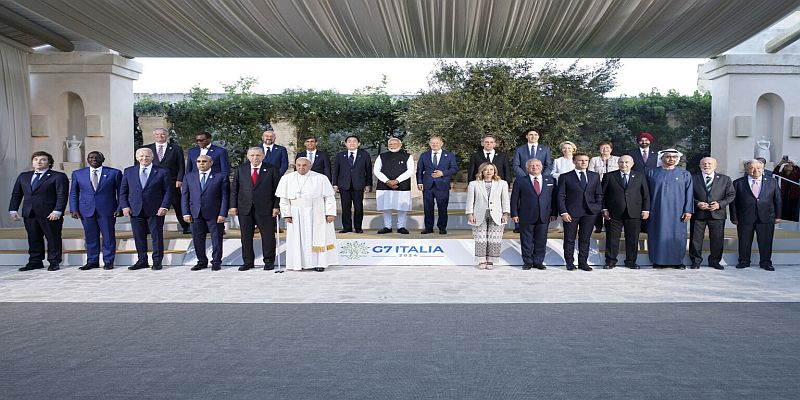Multilateral Financial Institutional Systems Must Be Reformed

Every nation today faces a convergence of complex and dynamic challenges, which pose serious threats to security and prosperity. Developed economies risk diminished growth and may struggle to guarantee sustained prosperity, while their less developed counterparts grapple with risks that undermine economic growth.
Africa continues to endure numerous conflicts, including long forgotten wars that have decimated countless lives. In Sudan, hundreds of thousands have died, millions are displaced and face starvation. In the Middle East, the conflict in Gaza has claimed tens of thousands of lives, devastated the livelihoods of millions, and caused global economic shockwaves. Europe is grappling with a major conflict that has brought unthinkable carnage and widespread economic disruption.
In the Horn of Africa, particularly Kenya, the region is still recovering from deadly floods and the longest drought on record. Southern Africa is experiencing a similar pattern of destructive flooding followed by severe droughts. Even Europe faces deadly extreme climate events.
We find ourselves in the grip of relentless global challenges of unprecedented magnitude. Only effective collective action by the international community can offer a reasonable chance of managing and overcoming these challenges.
At the Africa Climate Summit, the AU adopted two fundamental propositions: firstly climate-positive growth to unlock Africa's vast potential in renewable energy, mineral wealth, and agricultural potential, catalyzed by our continent's demographic dividend and, secondly, a new architecture of international financial institutions to alleviate sovereign debt burdens, enabling our economies to invest in resilient growth while providing critical public goods.
Far too many countries are forced to choose between repaying creditors and investing in their economy and people. Three weeks ago, President Biden and I launched the Nairobi-Washington vision for debt, development and sustainable finance. I urge the international community and all G7 members to support this initiative to enable countries to pursue ambitious investments in their own development while addressing global challenges and mitigating debt.
Africa also urges the G7 to advocate strongly for the reform of the multilateral financial institutional system, to give the Global South, and in particular, Africa, access to concessional, long-term and agile finance, and a greater voice and role in decision making. I also urge the G7 to embrace the Common African Position on the reform of the UN Security Council. No global institution can claim to champion humanity's universal values in 2024 while perpetuating the systematic marginalization of 1.4 billion people from Africa's 54 nations. Multilateral institutions must promote the diverse aspirations of all of humankind and must be just, fair, and inclusive.
As I did in my letter to each IDA donor country, including G7 members, following a successful IDA replenishment Summit in Nairobi in April this year, I reiterate my call for the doubling of your contribution to the IDA 21 and the ADF 17 replenishment drives, and to equally support the IMF's SDR reallocation to ADB and other African multilateral institutions, so as to benefit developing countries, especially in Africa.
In making this case, we seek equitable financing and also pursue a partnership for progress. We see the G7's Partnership for Global Infrastructure and Investment (PGI) as an excellent starting point because it will strategically leverage our African Green Industrialisation Initiative (AGII), creating synergy for the mutual benefit of the G7 and Africa. There is a significant opportunity for the G7 to invest in projects that address Africa's significant infrastructure gaps and thus turbocharge our development, and I am encouraged by the commitments that have been announced in this respect by the PGI Leader Forum, co-hosted by the G7 presidency and President Biden.
Africa’s abundant energy resources, uptake of pioneering technologies, and commitment to innovation place us at a promising vantage point for transformative partnerships and investments. In Kenya, a collaboration with Microsoft of the US and G42 of the UAE is developing a $1 billion green data centre, which combines green energy and AI to exemplify a future of transformative possibilities. This investment is among many that will take advantage of our competitive and abundant green energy.
AI has revealed to us the possibilities of exponential efficiency and productivity, radical enhancements in the performance of people and systems, and improvements in human well-being and quality of life. At the same time, we have also witnessed the potential for AI to be weaponized to accentuate biases, escalate the propagation of extreme ideologies and enable a broad range of dangerous, antisocial conduct and abuses.
There is an opportunity for our partnership to mitigate the concentration of AI capabilities and benefits among a few countries which risk deepening existing inequalities. We must commit to ensure that the benefits and governance mechanisms of AI are equitably distributed, and promote the inclusion of people from all regions, particularly the historically underrepresented.
As we mobilise to take ambitious collective action to confront global problems, Africa is determined to play its part in full, and that is why the AU is set for a major strategic overhaul for it to become a critical agency, recognised and engaged by the global community to address our shared challenges and promote our collective prosperity. The AU reform agenda also is aimed at supporting African countries to deliver development that is responsive, people-centred, democratic and accountable.
In every collective endeavour, let us scale up the benefits of a G7-Africa partnership to reach and transform every part of the world. This is why Kenya calls on the G7 to urgently support the multinational security support mission to Haiti.
Guided by the wisdom of an African proverb, "When spiders combine their webs they can tie up a lion", we in Africa recognize that collective action is our only way forward. This is why the continent's leaders are united in developing and implementing bold, solution-driven actions to confront both continental and global challenges. By combining the spider webs of the AU and the G7, we can effectively tie up prevailing global challenges.
By His Excellency William Ruto, C.G.H., PhD;
President of the Republic of Kenya
